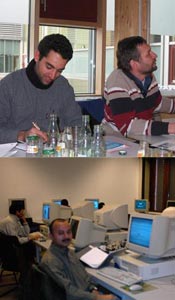The University of Oldenburg puts emphasis on the agreements for Good Scientific Practice as given by the Deutsche Forschungsgemeinschaft (DFG). The most recent prominent cases of plagiarism should remind students of the negociated agreement of the scientific community.
We expect students to read the following paper "Safeguarding Good Scientific Practice" by DFG given in German and English langauge (second part).
Please also see the official guidelines by the University of Oldenburg (30.09.2002)
Recommendations: Exerpt of "Safeguarding Good Scientific Practice"
„Rules of good scientific practice shall include principles for the following matters (in general, and specified for individual disciplines as necessary):
- fundamentals of scientific work, such as
- observing professional standards,
- documenting results,
- consistently questioning one’s own findings,
- practising strict honesty with regard to the contributions of partners, competitors, and predecessors,
- cooperation and leadership responsibility in working groups (recommendation 3), �
- mentorship for young scientists and scholars (recommendation 4), �
- securing and storing primary data (recommendation 7), �
- scientific publications (recommendation 11)."
To read the full paper please follow this link
Excerpt from the DFG memorandum
"Sicherung Guter Wissenschaftlicher Praxis",
German/English,
Deutschen Forschungsgemeinschaft,–Weinheim: Wiley-VCH, 1998
ISBN 3-527-27212-7
What are the consequences of plagiarism?
Legal framework: From the examination regulations for the Master's degree programmes of the Faculty of Mathematics and Natural Sciences.
Section 14 Paragraph 3:
„If a student attempts to influence the result of their performance in an examination by means of cheating or by other unauthorised means, the examination will be graded as a fail. Individuals who have violated the examination regulations may be barred from continuing the examination concerned. In that case, the examination in question will be graded as a fail. Before a decision is taken by the Examining Board in line with clauses 1 and 2, the student will have the opportunity to be heard. The student will continue to qualify for the examination until the Examining Board has taken a decision, unless the invigilator decides that temporary exclusion of the student is necessary for the proper conduct of the examination. In serious or repeated cases of fraud, the Examining Board may bar the student from continuing the Master's programme. In this case, the student in question will definitively fail the Master's programme.”
Find the current examination regulations here.



